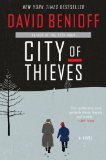Summary | Excerpt | Reading Guide | Reviews | Beyond the Book | Readalikes | Genres & Themes | Author Bio

Critics' Opinion:
Readers' Opinion:
First Published:
May 2008, 272 pages
Paperback:
Apr 2009, 272 pages
 Book Reviewed by:
Book Reviewed by:
Kim Kovacs
Buy This Book
My grandparents picked me up at the Sarasota airport; I stooped to kiss them and they smiled up at me, always slightly bemused in the presence of their giant American grandson (at six foot two I'm a giant next to them). On the way home we bought pompano at the local fish market; my grandfather grilled it adding nothing but butter, salt, and fresh lemon. Like every dish he made, it seemed incredibly easy to do, took him ten minutes, and tasted better than anything I'd eaten that year in LA. My grandmother doesn't cook; she is famous in our family for her refusal to prepare anything more complicated than a bowl of cereal.
After dinner my grandmother lit a cigarette and my grandfather poured three glasses of homemade black currant vodka. We listened to a choir of cicadas and crickets, stared out at the black Gulf, and slapped away the occasional mosquito.
"I brought a tape recorder with me. I thought maybe we could talk about the war."
I thought I caught my grandmother rolling her eyes as she flicked her ash onto the grass.
"What?"
"
You're forty years old. Now you want to know?"
"I'm thirty-four." I looked at my grandfather and he smiled at me. "What's the matter? You guys were Nazis? You're hiding your Nazi past?"
"No," he said, still smiling. "We weren't Nazis."
"You thought I was forty years old?"
"Thirty-four, forty—" She made her pshh sound, always accompanied by a dismissive wave of the hand, slapping away the stupidity.
"Who cares? Get married. Find a wife."
"You sound like every other grandmother in Florida."
"Ha," she said, a little wounded.
"I want to know what it was like. What's so horrible about that?"
She nodded at my grandfather while pointing the burning tip of her cigarette at me.
"He wants to know what it was like."
"Darling," said my grandfather. Just that, nothing else, but my grandmother nodded and stubbed out her cigarette on the glasstop table.
"You're right," she told me. "You want to write about the war, you should."
She stood, kissed me on the top of my head, kissed my grandfather on the lips, and carried the dishes inside the house. For a few minutes we sat there quietly, listening to the waves breaking. He poured us fresh vodkas, happy to see I'd finished mine.
"You have a girlfriend?"
"Uh-huh.".
"The actress?"
"Yeah."
"I like her."
"I know you do."
"She could be Russian," he said. "She has the eyes...If you want to talk about Leningrad, we talk about Leningrad."
"I don't want to talk. I want you to talk."
"So, OK, I'll talk. Tomorrow?"
He kept his word. For the next week we sat together every day on the concrete deck and I recorded his stories. A few hours in the morning, breaking for lunch, then again in the afternoon—my grandfather, a man who hated to speak more than two consecutive sentences in mixed company (meaning in the company of anyone other than his wife), filled minicassette after minicassette with his words. Too many words for one book—truth might be stranger than fiction, but it needs a better editor. For the first time in my life I heard my grandfather curse and speak openly about sex. He talked about his childhood, about the war, about coming to America. But mostly he talked about one week in 1942, the first week of the year, the week he met my grandmother, made his best friend, and killed two Germans.
When he was finished telling his stories, I questioned him about various details—names, locations, weather conditions on certain days. He tolerated this for a while, but eventually he leaned forward and pressed the Stop button on the tape recorder.
"It was a long time ago," he said. "I don't remember what I was wearing. I don't remember if the sun came out."
Reprinted by arrangement with Viking, a member of Penguin Group (USA) Inc., from City of Thieves. Copyright © David Benioff, 2008.





The Funeral Cryer by Wenyan Lu
Debut novelist Wenyan Lu brings us this witty yet profound story about one woman's midlife reawakening in contemporary rural China.
Your guide toexceptional books
BookBrowse seeks out and recommends the best in contemporary fiction and nonfiction—books that not only engage and entertain but also deepen our understanding of ourselves and the world around us.